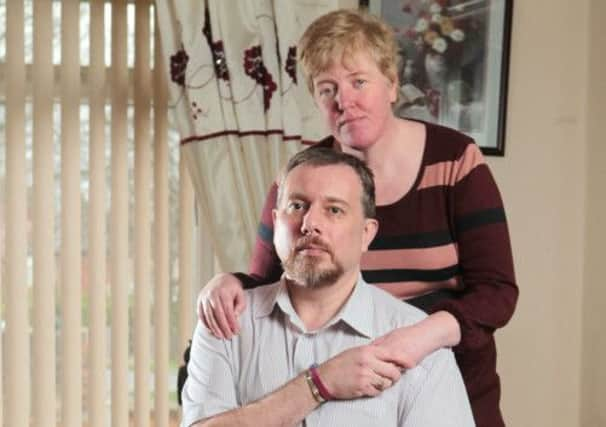Disabled hero wins new battle over allowances


Adam Douglas, 45, who founded the Forgotten Heroes charity, received serious and extensive injuries in a grenade attack in 2003.
He faced 20 major operations and has been left with severe spinal injuries and mobility problems, requiring care from his wife Maria.
Advertisement
Hide AdAdvertisement
Hide AdHowever, following covert investigations into just how disabled he was by his insurance company, the Department of Work and Pensions (DWP) saw fit to cut the former lance corporal’s £70-a-month carers allowance – which was being paid to his wife.
He went to a tribunal last week to get the payment reinstated but the decision was deferred.
Now after receiving the judgement he said: “I am declaring victory. I am no longer seen as a benefit fraudster. My honour has been reinstated.
“As a symbol the carer’s allowance means everything. It is the fact my wife is the carer and she does out of love and devotion.
Advertisement
Hide AdAdvertisement
Hide Ad“This battle left me feeling suicidal, even made me doubt my own injuries and at times question whether I had been in Iraq.”
Lance Corporal Douglas from Fearnville, Leeds, who served with the East and West Riding Regiment, said that while serving on the outskirts of Basra in 2003 he was caught up in rocket-propelled grenade attack which blew up a wall he was near – a fierce firefight followed.
He said: “There was a compressed spinal fracture, multiple disc herniations, partial paralysis of my left leg, a neurological disorder called cauda equina, burns on my back, neck and arms, spleen, bladder and bowel injuries, general nerve tissue damage and soft tissue damage.
“I was nearly a foot away from it. I still managed to return fire and they were shooting at me, I then ran about half a mile and then it began to hit me.
Advertisement
Hide AdAdvertisement
Hide Ad“You just expect when you return home that you will be looked after, if something happens that you don’t have to fight for it.”
Lance Corporal returned to Iraq in late 2004, this time as a Ministry of Defence employed civilian providing logistical support. In 2006 he suffered a workplace accident.
“Somebody else wasn’t looking at what they were doing and fell on my head from a great height. This exaggerated all my old injuries and set off the neurological disorder again,” he added. The injuries mean Mr Douglas has trouble walking around, bathing, dressing, and going to the toilet.
At the tribunal, he maintained that his ability to perform many daily tasks had not improved and his mobility had got worse.
Advertisement
Hide AdAdvertisement
Hide Ad“I have always had the ability to stand, to walk, but walking has always been with assistance,” he said.
Now he says he wants to concentrate on running his charity, and helping former soldiers and their carers appeal similar DWP decisions.
He lives with his wife, who is a school cook, and teenage daughters, Jessica, 16 and Sophie, 13.
During the tribunal last week the hearing was told the DWP cut his benefit and demanded a repayment of £351, after his life insurer carried out a covert investigation when he tried to cash in a policy that would pay off his £28,500 mortgage.
Advertisement
Hide AdAdvertisement
Hide AdIn 2010 it made a covert recording allegedly showing him move objects – including some drawers – as men helped him move house.
It was adjudged that he did not meet their total permanent disability claim criteria and a joint police and DWP investigation was opened before being discontinued last March.
Mr Douglas said he was still suffering during the move but “on the day, as we do in the Armed Forces, sometimes you have to dig deep and overcome certain things”.
He added that he was in pain after the house move and attended hospital the next day.
Advertisement
Hide AdAdvertisement
Hide AdMost discussion during the tribunal was based around whether his condition had changed between 2007 and 2011.
Last week he said: “It is a progressive degenerative injury. The spine is something they can’t fix.”